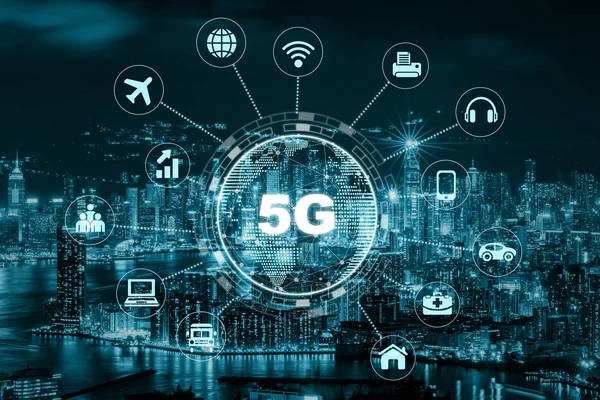 |
| 5G technology promises to revolutionize connectivity and transform various industries. |
The advent of 5G technology is set to revolutionize the way we connect to the internet, interact with smart devices, and experience digital content. As the fifth generation of mobile network technology, 5G offers unprecedented speed, lower latency, and the capacity to connect a vast number of devices simultaneously. In this blog post, we’ll explore how 5G will transform connectivity and impact various aspects of our daily lives and industries.
### What is 5G?
5G, or fifth-generation wireless technology, is the latest standard for mobile networks. It promises significantly faster download and upload speeds compared to its predecessor, 4G LTE, with speeds potentially reaching up to 10 Gbps. Additionally, 5G offers lower latency, which means reduced lag time, making real-time interactions more seamless.
### Key Features of 5G
1. **Enhanced Speed:**
5G networks can deliver speeds up to 100 times faster than 4G. This enables quicker downloads, smoother streaming, and improved overall performance for high-bandwidth applications.
2. **Low Latency:**
Latency in 5G networks can be as low as 1 millisecond, compared to around 30-50 milliseconds for 4G. This ultra-low latency is crucial for applications that require real-time feedback, such as autonomous vehicles and remote surgeries.
3. **Increased Connectivity:**
5G can support a massive number of connected devices per square kilometer, making it ideal for the Internet of Things (IoT). This allows for smarter cities, homes, and industries with interconnected devices communicating seamlessly.
4. **Network Slicing:**
5G technology allows for network slicing, which means creating multiple virtual networks within a single physical 5G network. Each slice can be customized to meet specific requirements, ensuring optimal performance for different applications.
### How 5G Will Transform Connectivity
1. **Smart Cities:**
5G will enable the development of smart cities, where everything from traffic lights to waste management systems is interconnected and intelligently managed. This will lead to improved urban planning, reduced energy consumption, and enhanced public services.
2. **Autonomous Vehicles:**
The low latency and high reliability of 5G are essential for the safe operation of autonomous vehicles. Real-time data exchange between vehicles, traffic signals, and infrastructure will make self-driving cars a reality, reducing traffic accidents and improving road safety.
3. **Healthcare:**
In the healthcare sector, 5G will facilitate telemedicine and remote surgeries, allowing doctors to perform operations from a distance with precision. Wearable health devices will provide real-time monitoring and data transmission, improving patient care and outcomes.
4. **Entertainment and Media:**
5G will revolutionize the entertainment industry by enabling ultra-high-definition streaming, virtual reality (VR), and augmented reality (AR) experiences. This will lead to more immersive gaming, live events, and interactive content.
5. **Industry 4.0:**
Manufacturing and industrial sectors will benefit from 5G through enhanced automation and robotics. Real-time monitoring and control of machinery will increase efficiency, reduce downtime, and enable predictive maintenance.
6. **Education:**
The education sector will see significant improvements with 5G, enabling virtual classrooms, interactive learning environments, and remote access to educational resources. Students and teachers will benefit from enhanced connectivity and real-time collaboration.
### The Challenges Ahead
While the potential of 5G is immense, there are challenges to overcome:
1. **Infrastructure Development:**
Deploying 5G infrastructure requires significant investment in new antennas, towers, and fiber optics. This can be costly and time-consuming, especially in rural and underdeveloped areas.
2. **Spectrum Allocation:**
5G requires access to a wide range of frequency bands, including high-frequency millimeter waves. Governments and regulatory bodies must manage spectrum allocation efficiently to avoid interference and ensure optimal performance.
3. **Security Concerns:**
With increased connectivity comes heightened security risks. Ensuring robust cybersecurity measures to protect against data breaches and cyberattacks is crucial.
### Conclusion
The future of 5G is incredibly promising, with the potential to transform connectivity and revolutionize various industries. As 5G technology continues to roll out globally, we can expect significant advancements in smart cities, autonomous vehicles, healthcare, entertainment, industrial automation, and education. While challenges remain, the benefits of 5G far outweigh the hurdles, paving the way for a more connected and intelligent world.
Stay tuned to our blog for more updates on the latest in technology news and how advancements like 5G are shaping our future.
---
**SEO Keywords:** 5G technology, future of connectivity, smart cities, autonomous vehicles, 5G in healthcare, 5G entertainment, Industry 4.0, virtual reality, augmented reality, 5G challenges.
By focusing on these aspects, this blog post can attract a wide audience interested in understanding how 5G will impact various sectors and our daily lives.





No comments: